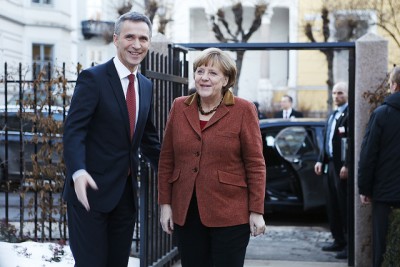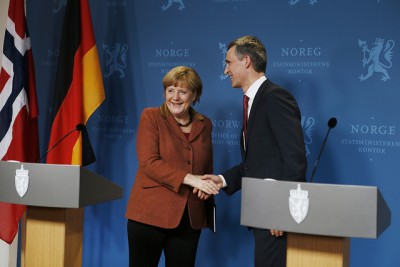German Chancellor Angela Merkel made another whirlwind visit to Oslo on Wednesday, with a delegation of energy executives in tow. It was her fifth meeting with Norwegian Prime Minister Jens Stoltenberg in just the past nine months, and energy and economic issues were on the agenda.

Norway is Germany’s second-largest supplier of natural gas after Russia, with Norway keen to keep exporting and Germany in need of new energy sources that are cleaner than coal. Merkel’s decision nearly two years ago to phase out Germany’s nuclear power plants by 2022 launched an energy revolution that now is a major campaign issue in the run-up to her country’s national elections. She needs to secure enormous amounts of new power and lower Germans’ rising energy costs.
That’s where Norway can help. While Norway, which is not a member of the European Union, can’t do much to aid Merkel with her euro crisis issues, Norway is a European superpower in terms of energy supplies because of its oil and gas industry. As an economically strong country and close ally, Norway also represents minimal political risk and a high degree of stability and security around energy delivery.

German energy companies like Wintershall are also getting increasingly interested in and active on the Norwegian Continental Shelf, so it was no surprise that Merkel had with her a group of German industrial heavyweights from the energy sector including top executives from Wintershall, RWE-DEA, Voith and VNG. Newspaper Aftenposten reported that they met with Norwegian Finance Minister Sigbjørn Johnsen while Merkel and Stoltenberg had an hour-long meeting in the government’s guest house behind the Royal Palace. After a press conference, they all had a “working dinner” that also was attended by Norway’s Oil & Energy Minister Ola Borten Moe, who has welcomed the interest of foreign companies in Norwegian offshore oil and gas fields. Several top Norwegian energy executives from Statoil, Statnett, Hydro and Statkraft were at the dinner as well.
No new energy delivery plans were announced, with both Merkel and Stoltenberg merely confirming that Germany has a great need for new sources of energy, that Norwegian gas is important and that Norwegian renewable energy can also play a major role in the Norwegian power market. Power cables between Norway and Germany can transmit excess hydroelectric power from Norway to Germany and excess wind power from Germany to Norway as needs arise, they noted.
Low prices for coal at present are complicating Merkel’s goals of relying on cleaner sources of power like renewable energy and gas. It’s difficult for gas-powered plants to compete with coal on price, but Merkel claimed the situation would change over time. She said Germany would continue its close cooperation with Norway, stressing, though, that it’s not the government that buys gas but German businesses.
Merkel and Stoltenberg also said they discussed the recent terrorist attack on a gas plant in Algeria, where Statoil was a co-operator, along with the violence and unrest in Mali, Syria and Egypt. They also discussed negotiations over Iran’s controversial nuclear program.
Stoltenberg said the two also discussed possibilities and opportunities in the Arctic, where Norway is a major player regarding energy and other natural resources. While Germany’s energy needs can make more oil and gas exploration in the Arctic attractive, the climate issues and environmental challenges can cause as huge a dilemma for the German government as they do for the Norwegians.
Views and News from Norway/Nina Berglund
Please support our news service. Readers in Norway can use our donor account. Our international readers can click on our “Donate” button:

